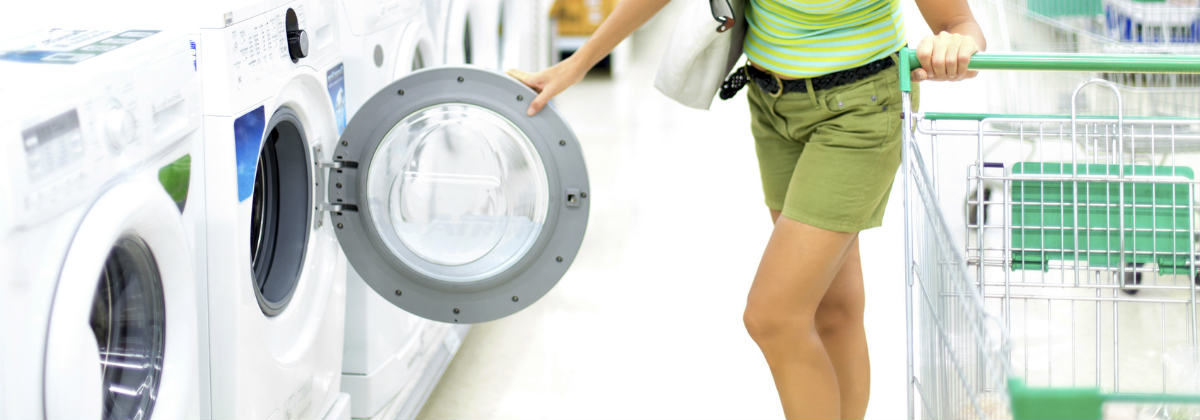KEY POINTS
- Gas and heat pump dryers are the most energy efficient.
- For those on a budget, vented dryers typically come with the lowest up-front cost.
- In addition to the type of dryer, you’ll want to consider the capacity and size requirements of your new appliance.
Whether it’s size and drying capacity, or features and running cost, there are plenty of factors to consider to make sure you’re buying the best clothes dryer for your home. Here’s a guide to the types of clothes dryers you’ll find in stores, their differences and how much they’ll set you back.
Types of dryers
If you’re looking at an electric dryer, there are three different kinds – vented, condenser and heat pump condenser. Alternatively, you can opt for a gas dryer. Here are the key differences between the different types of dryers:
Gas dryers
Buying a gas clothes dryer in Australia will usually set you back between $1,600 and $4,000. These dryers use gas to heat the tumbler and in turn, use less electricity to fuel the appliance compared to standard dryers. In terms of wet weight capacity, expect 4kg to 9kg. Other traits include:
- Generally cheaper to run
- Often heats up clothes faster than electric dryers
- Require a vent to the outside, thus not ideal for small apartments
Vented dryers
Vented dryers heat up air and pass it into the drum to dry your clothes. Once the hot air has become too moist to dry any further, it’s vented out of the drum and replaced with new, dry air. This type of dryer can cost you between $350 and $3,700. Most vented dryers range from 3kg to 9kg of capacity. Here are a few other facts to keep in mind:
- Cheaper to buy than other types of clothes dryers
- Must be used in well-ventilated rooms, not tight and enclosed spaces
- Excess moisture can cause mould to grow on walls and around the vented clothes dryer
- Can cause a potential fire hazard, especially if inside an enclosed space
- Can be mounted on a wall
Condenser dryers
Condenser clothes dryers extract the water vapour from the hot air before expelling it. This method of dealing with moist air means less humidity than a vented dryer, although it doesn’t do anything for the heat itself. A condenser clothes dryer can cost between $600 and $1,700, although the majority of models are under the $1,000 mark. Here are some things to keep in mind when considering this type of dryer:
- Condenser dryers don’t require as much ventilation as tumble dryers, thus you’re not restricted to where you position the dryer, ideal for apartment living
- Most models are too heavy to be wall-mounted but can be stacked on a front-load washing machine
- Considered to be one of the least energy efficient types of clothes dryers
Heat pump dryers
Heat pump dryers are a type of condenser dryer that recycles the hot air after extracting moisture. This dryer type is increasingly popular due to a desire for more energy-efficient appliances. Expect to fork out between $1,500 and $4,000, although you can find cheaper heat pump dryers from some brands. On the other hand, there are models from high-end brands that reach up to $29,000.
- Typically, more expensive than vented or condenser dryers
- Makes up for the higher purchase price by being more energy efficient
- It can take years for the cheaper running cost to offset the higher price tag
- Doesn’t vent heated air or water vapour, so no heat and no humidity in your laundry room
Factors to consider when buying a clothes dryer
In addition to the types of dryers, there are several other factors to consider, including the capacity, features and space requirements. We explore these factors below:
Dryer capacity
The first thing to figure out when it comes to a clothes dryer is how large you need it to be. Are you living by yourself or are you part of a big family? How much clothing do you and your family wash on a weekly basis? Dryer capacity tends to range from 4kg to 10kg, but if you’ve got no clue about your capacity needs, here are a couple of tips:
- The capacity of a dryer is measured in kilograms and refers to the weight of the clothes once dry, not while they’re sopping wet and straight out of the washing machine.
- A general rule of thumb is the capacity of your dryer should be double that of your washing machine. While you don’t need to aim for exactly double, just remember that your dryer capacity should generally be larger than the capacity of your front loader or top-load washing machine.
Dryer Features
Common features across most models and price points include stainless steel drums, extended tumbling cycles, multiple temperature choices, cycle options for different kinds of clothing, safety locks and no-wrinkle functions. Some additional features to look out for in any type of dryer include:
- Energy ratings: look for energy-efficient dryers – the more stars the better! While an energy-efficient dryer might cost you more upfront, it can help you save in the long run with cheaper energy bills.
- Size: apart from load capacity, it’s also important to measure the space where you want to fit the dryer, as not all models are the same size.
- Programs: while the basic program might suffice, you might want to look out for models that feature additional programs such as anti-crease or eco-mode.
- Lint filter: filters typically need to be cleaned regularly, especially if you have a vented dryer, so look out for dryers with easy to access lint filters.
- Auto-sensing: this is a particularly helpful feature that automatically stops the dryer once it senses that the load is dry. This helps keep your clothes from over-drying and saves on electricity bills.
- Electronic display: the more advanced the dryer is, the more high-tech the front panel will be. Electronic displays allow you to see at a glance how much time is remaining and when the lint filter or water container needs to be emptied.
Which type of clothes dryer should I buy?
As there are pros and cons to each type of dryer, it ultimately comes down to your budget and personal needs. To help you decide which brand to buy, why not check out our customer ratings for clothes dryers, which can be found via the link below.
Clothes Dryer Reviews & Ratings
Original Author: Tahnee-Jae Lopez-Vito





Share this article